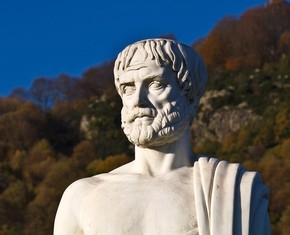The views expressed in our content reflect individual perspectives and do not represent the authoritative views of the Baha'i Faith.
Did you know the word “god” isn’t just a noun – that it’s also an active verb?
Here’s how the Oxford English Dictionary defines “god” as an action: “1. transitive. To cause to become one with God; to make (a person) a partaker of the Divine nature. Chiefly in passive, esp. in godded with God.”
Although most of us aren’t familiar with the usage of “god” as a verb, one of the purposes of life, according to the Baha’i teachings, is to become God-like or godly — or, biblically speaking, to become the “image and likeness of God,” as explained here by Abdu’l-Baha:
It is recorded in the Holy Bible that God said, “Let us make man in our image, after our likeness.” It is self-evident that the image and likeness mentioned do not apply to the form and semblance of a human being because the reality of Divinity is not limited to any form or figure. Nay, rather, the attributes and characteristics of God are intended. Even as God is pronounced to be just, man must likewise be just. As God is loving and kind to all men, man must likewise manifest loving-kindness to all humanity. As God is loyal and truthful, man must show forth the same attributes in the human world. Even as God exercises mercy toward all, man must prove himself to be the manifestation of mercy. In a word, the image and likeness of God constitute the virtues of God, and man is intended to become the recipient of the effulgences of divine attributes. – The Promulgation of Universal Peace (emphasis added).
Some foreign words become so familiar in English that, over time, they end up becoming English words. Linguists call this process “assimilation.” In the first article of this series, we learned a new term: theophoric metamorphosis. Now here is a simpler term for basically the same thing: theosis, which the Oxford English Dictionary simply defines so: “Theology. rare. Deification.”
So Baha’i theosis suggests a process of self-transformation, through spiritualization, thereby becoming more “godlike,” or godly. In other words, as Abdu’l-Baha has said, “… man is intended to become the recipient of the effulgences of divine attributes.”
That’s what the Baha’i Calendar symbolizes — not only reckoning time, but transforming time into a golden opportunity to manifest godly attributes by acquiring virtues.
In his Tablet of Visitation for the Point [the Bab] and his Letters of the Living, the Bab explains that God’s attributes are manifested in the greatest degree imaginable — actually, far beyond our imaginations:
- O Thou Who art He who is the All-Glorious above every [possessor of] Glory.
- O Thou Who art He who is the Utterly Exalted above every possessor of Exaltedness!
- O Thou Who art He who is the Utterly Elevated beyond everyone characterized by being raised Aloft!
- O Thou Who art He who is the Supremely Joyful beyond everyone characterized by Happiness [Delight]!
- O Thou Who art He who is the Utterly Inaccessible beyond everyone characterized by Remoteness!
- O Thou Who art He who is the Supremely Great beyond everyone characterized by Grandeur!
- O Thou Who art He who is the Most Hearing beyond everyone possessed of Hearing! …
- O Thou Who art He who is the Supreme Answerer beyond every possessor of an Answer! …
- O Thou Who art He who is the Supreme Questioner beyond every possessor of a Question! – https://hurqalya.ucmerced.edu/node/4151 (with slight editing).
The final verse, quoted above, nay also be provisionally translated so: “O Thou Who art the Supreme Questioner above all endowed with questions.” As for the Name of God — coined by the Bab — as “the Supreme Questioner,” here God is represented as the greatest manifestation of all those who ask questions.
As for the Bab’s use of such lofty superlatives, Stephen Lambden explained:
Note the following initial seven invocations with their repeatedly opening superlative … This pattern of the Invocation of various Names or Attributes of God/ the Bab/ “Him Whom God will make manifest” [Baha’u’llah] initially in their superlative form continues for several pages (pp. 204–211) containing well over 200 further invocations, sometimes addressing the Divine with unusual titles, names or other dimensions of the mediatory Deity. Of especial interest in this connection are the … invocations … according God the Name the “Greatest Answerer” and … the “Greatest Questioner.” – https://hurqalya.ucmerced.edu/node/4151 (with slight editing).
The Bab’s Name of God as “the Supreme Questioner” is a neologism, a new word in Arabic that the Bab coined for a special purpose.
So how does all this relate to Baha’i theosis, or the Baha’i process of self-transformation through spiritualization, thereby becoming more “godlike,” or godly? As Abdu’l-Baha has said, “man is intended to become the recipient of the effulgences of divine attributes,” and God is the source of every “Name of God” or “attribute of God,” as the following schematic may well illustrate:
Source: God as the Supreme Questioner
Attribute: Questions
Recipient: Man as a questioner
Action: Questioning in the search after truth
Transformation: Increased capacity to question
Virtue: Greater grasp of the question – the truth of the matter.
In Part 39 of this series, “God Asks Questions: We Should, Too,” this example was given:
And they [Adam and Eve] heard the voice of the Lord God walking in the garden in the cool of the day: and Adam and his wife hid themselves from the presence of the Lord God amongst the trees of the garden. And the Lord God called unto Adam, and said unto him, Where art thou? And he said, I heard thy voice in the garden, and I was afraid, because I was naked; and I hid myself. And he said, Who told thee that thou wast naked? Hast thou eaten of the tree, whereof I commanded thee that thou shouldest not eat? And the man said, The woman whom thou gavest to be with me, she gave me of the tree, and I did eat. And the LORD God said unto the woman, What is this that thou hast done? And the woman said, The serpent beguiled me, and I did eat. – Genesis 3:8–13 (questions italicized).
Therefore, if “questioning” includes all the questions God has addressed to man — as seen in the Bible and in the Qur’an — then man develops a questioning nature and begins thinking, pondering, and considering, seeking truth, illumination and enlightenment from God. This then establishes a very interesting relationship with God, whereby when God provokes man to think by asking him questions, man then begins to develop a curiosity and inquires of God by studying His creation.
God, of course, transcends every “Name” and attribute. That said, God is known by His will — as revealed by the prophets and messengers of God — and by divine qualities which, as this “Transforming Time” series has demonstrated, can then be manifested as human virtues.
Taking the quality of questions into consideration — and by contemplating God, Who is represented by the Bab as the “Supreme Questioner” — we are inspired to redouble our efforts in our individual and collective quests to independently search after truth, acquire knowledge and wisdom, and apply what we have learned, in answer to our questions, to the betterment of ourselves and society at large.
That’s one more way we can transform time by turning godly perfections into goodly actions. Asking questions constitutes one of those actions, which makes it a part of the process of spiritual transformation and enlightenment.
















Comments
Sign in or create an account
Continue with Googleor